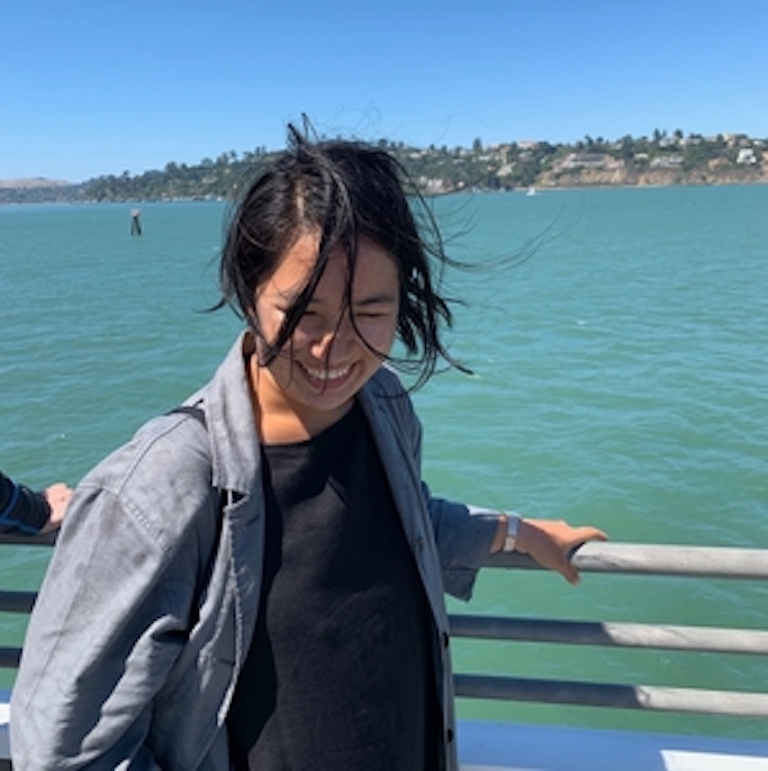This piece is the second in a series about graduate student poets in the Department of English at Berkeley.
Lindsay Choi joined the English Department as a Ph.D. student in 2018 after completing their undergraduate work in English and Philosophy at Berkeley earlier that year. They are the author of Transverse (Futurepoem Books, 2021), which was a finalist for the Lambda Literary Award in Transgender Poetry (2022), and the chapbooks Who Can Remember His Past Lives (Belladonna*, 2022) and Matrices (speCt! Books, 2017). Their work has been recognized with a Kundiman fellowship and a Baltic Writing Residency, and was included in the Berkeley Art Museum’s Way Bay exhibition (2018). With Noah Ross they run the chapbook press MO(O)ON/IO.
At Berkeley, Lindsay is a co-organizer of the English Department Poetry Colloquium, where they collaborated with Small Press Traffic to curate the High Dawn Reading Series during the 2020-21 academic year. They also co-organize the Interdisciplinary Marxist Working Group and held a graduate student fellowship from the Arts Research Center during the 2021-22 academic year. You can find work from their ongoing manuscript project Heliotrope in Aster(ix) Journal, and listen to a sample of their in-progress audio work at futurefeed. Their reading with Aditi Machado for the Holloway Poetry Series can be found here.
We asked Lindsay about their recent creative and critical projects, and about how they balance the two. Here are their answers:
What is the focus of your current research? What have you been working on lately, or looking forward to?
My current research has been focused on the “line” in Theresa Hak Kyung Cha’s concrete poetry. The larger project is still developing, but generally, I work on 20th-century transpacific and Asian American poetry.
Would you say that your research informs your poetry? If so, how so? If not, why not?
Yes, in a way—it’s often the case that poetry leads me to my research. For example, my initial sense of my dissertation project developed from the germ of a creative manuscript I had been working on since the summer before I started graduate school—I had been translating and re-translating a single poem by modernist Korean poet Seo Jeong Ju every day for several months, and, at the same time, compiling a large folder of research about the poem and its historical background. My academic work helps me to isolate and articulate what, in my poetry, I tend to encounter as intuitions and curiosities. In my creative manuscript, I found myself circling around a question involving how lyric poems contain or otherwise mediate history, which led to further questions about the specific historical circumstances of the Japanese colonization of Korea and how this knowledge might guide our approaches to reading the poems written by Korean authors at the time—so, in my research now, I’m trying to develop more argumentatively and analytically an account of the hermeneutic demands of a certain kind of poetry defined by a particular set of historical conditions. But the relationship between my academic work and poetry has more often than not been such that the two are necessary to each other. I often find that bobbing somewhere in the poetry, there’s the question I’ve been struggling to articulate in my academic work, and the process of writing my academic work helps me to understand and attach to what it is that I want from the use of poetic form—what and how the practice of writing poetry, rather than argumentative prose, helps me to think.
How does your life as a graduate student contribute to or intersect with your life as a poet, if at all?
My life as a graduate student allows me to enjoy my life as a poet. It can be hard to write poetry during the semester, when I’m trying to focus on my academic writing—it’s difficult for me to switch modes. The difference, briefly, is that academic writing needs an argument and evidence, and my poetry tends more often to deploy form in order to generate a field of inquiry. But being a graduate student allows me to spend all of my working hours reading, writing, and talking to other people about reading and writing, which lets the thoughts and questions that form the basis of my poetry brew. In the 2021-2022 school year, also, I was a graduate student fellow of the Arts Research Center’s Poetry and the Senses fellowship—this was an opportunity that carved out space in my schedule to prioritize the poetry-writing that surfaces research interests, for at least a couple of hours a month.
As a poet, why Berkeley?
I started writing poetry as an undergraduate at Berkeley, in an English 43B taught by Claire Marie Stancek, now a Berkeley Ph.D. alumna. It was in the spring semester of my freshman year, and she was the person who introduced me to contemporary poetry, and who motivated me to think harder about what it was that I wanted from sound and form in my own writing. From there, I started reading more and more, and going to poetry readings in the area—at Moe’s Books and at the Holloway series on campus, mostly—and in the spring of my sophomore year, I took English 143B with the visiting Holloway poet at the time, Anna Moschovakis. In that class, I began the majority of what would become my first book, Transverse. During that semester, my first poems were accepted for publication, I was a finalist for the Omnidawn chapbook contest—shortly after, I gave my first readings outside of the institution and published my first chapbook, and by the time I hit the end of my senior year, and I was choosing a PhD program to enroll in, I couldn’t bear the thought of leaving the Bay Area and the poetry scene here. There’s nothing else like it. It’s the world of poetry in the area but outside of UC Berkeley itself, really, that keeps me here.
